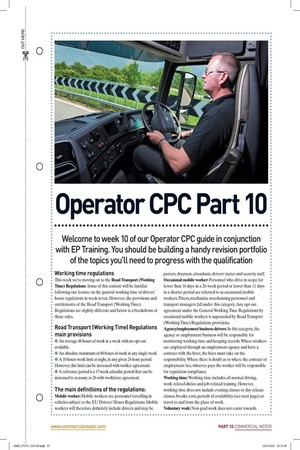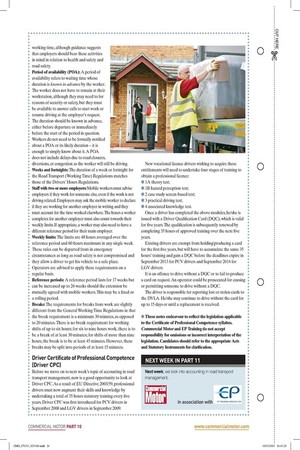Operator CPC Part 10 Welcome to week 10 of our
Page 17

Page 18

If you've noticed an error in this article please click here to report it so we can fix it.
Operator CPC guide in conjunction with EP Training. You should be building a handy revision portfolio of the topics you'll need to progress with the qualification Working time regulations This week we're moving on to the Road Transport (Working Time) Regulations. Some of this content will be familiar following our feature on the general working time of drivers' hours regulations in week seven. However, the provisions and entitlements of the Road Transport (Working Time) Regulations are slightly different and below is a breakdown of those rules.
Road Transport (Working Time) Regulations main provisions • An average 48 hours of work in a week with no opt-out available.
• An absolute maximum of 60 hours of work in any single week.
• A 10 hours work limit at night, in any given 24-hour period. However, this limit can be increased with worker agreement.
• A reference period is a 17-week calendar period that can be increased to as many as 26 with workforce agreement.
The main definitions of the regulations: Mobile worker: Mobile workers are personnel travelling in vehicles subject to the EU Drivers' Hours Regulations. Mobile workers will therefore definitely include drivers and may be porters, draymen, attendants, drivers' mates and security staff. Occasional mobile worker: Personnel who drive in scope for fewer than 16 days in a 26-week period or fewer than 11 days in a shorter period are referred to as occasional mobile workers. Fitters, mechanics, warehousing personnel and transport managers fall under this category. Any opt-out agreement under the General Working Time Regulations by occasional mobile workers is superseded by Road Transport (Working Time) Regulations provisions.
Agency/employment business drivers: In this category, the agency or employment business will be responsible for monitoring working time and keeping records. Where workers are employed through an employment agency and have a contract with the hirer, the hirer must take on the responsibility. Where there is doubt as to where the contract of employment lies, whoever pays the worker will be responsible for regulation compliance.
Working time: Working time includes all normal driving, work-related duties and job-related training. However, working time does not include evening classes or day release classes, breaks, rests, periods of availability (see next page) or travel to and from the place of work.
Voluntary work: Non-paid work does not count towards working time, although guidance suggests that employers should bear these activities in mind in relation to health and safety and road safety.
Period of availability (POA): A period of availability refers to waiting time whose duration is known in advance by the worker. The worker does not have to remain at their workstation, although they may need to for reasons of security or safety, but they must be available to answer calls to start work or resume driving at the employer's request. The duration should be known in advance, either before departure or immediately before the start of the period in question. Workers do not need to be formally notified about a POA or its likely duration — it is enough to simply know about it. A POA does not include delays due to road closures, diversions, or congestion as the worker will still be driving. Weeks and fortnights: The duration of a week or fortnight for the Road Transport (Working Time) Regulations matches those of the Drivers' Hours Regulations.
Staff with two or more employers: Mobile workers must advise employers if they work for someone else, even if the work is not driving related. Employers may ask the mobile worker to declare if they are working for another employer in writing and they must account for the time worked elsewhere. The hours a worker completes for another employer must also count towards their weekly limits. If appropriate, a worker may also need to have a different reference period for their main employer.
Weekly limits: The limits are 48 hours averaged over the reference period and 60 hours maximum in any single week. These rules can be departed from in emergency circumstances as long as road safety is not compromised and they allow a driver to get his vehicle to a safe place. Operators are advised to apply these requirements on a regular basis.
Reference periods: A reference period lasts for 17 weeks but can be increased up to 26 weeks should the extension be mutually agreed with mobile workers. This may be a fixed or a rolling period.
Breaks: The requirements for breaks from work are slightly different from the General Working Time Regulations in that the break requirement is a minimum 30 minutes, as opposed to 20 minutes. There is no break requirement for working shifts of up to six hours; for six to nine hours work, there is to be a break of at least 30 minutes; for shifts of more than nine hours, the break is to be at least 45 minutes. However, these breaks may be split into periods of at least 15 minutes.
Driver Certificate of Professional Competence (Driver CPC) Before we move on to next week's topic of accounting in road transport management, now is a good opportunity to look at Driver CPC. As a result of EU Directive 2003/59, professional drivers must now augment their skills and knowledge by undertaking a total of 35 hours statutory training every five years. Driver CPC was first introduced for PCV drivers in September 2008 and LGV drivers in September 2009. New vocational licence drivers wishing to acquire these entitlements will need to undertake four stages of training to obtain a professional licence: • 1A theory test; • 1B hazard perception test; • 2 case study screen-based test; • 3 practical driving test; • 4 associated knowledge test.
Once a driver has completed the above modules, he/she is issued with a Driver Qualification Card (DQC), which is valid for five years. The qualification is subsequently renewed by completing 35 hours of approved training over the next five years.
Existing drivers are exempt from holding/producing a card for the first five years, but will have to accumulate the same 35 hours' training and gain a DQC before the deadlines expire in September 2013 for PCV drivers and September 2014 for LGV drivers.
It is an offence to drive without a DQC or to fail to produce a card on request. An operator could be prosecuted for causing or permitting someone to drive without a DQC.
The driver is responsible for reporting lost or stolen cards to the DVLA. He/she may continue to drive without the card for up to 15 days or until a replacement is received.
• These notes endeavour to reflect the legislation applicable to the Certificate of Professional Competence syllabus. Commercial Motor and EP Training do not accept responsibility for omissions or incorrect interpretation of the legislation. Candidates should refer to the appropriate Acts and Statutory Instruments for clarification.







































